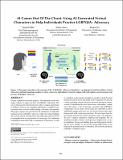| dc.contributor.author | Pillis, Daniel | |
| dc.contributor.author | Pataranutaporn, Pat | |
| dc.contributor.author | Maes, Pattie | |
| dc.contributor.author | Sra, Misha | |
| dc.date.accessioned | 2024-05-02T20:11:31Z | |
| dc.date.available | 2024-05-02T20:11:31Z | |
| dc.date.issued | 2024-03-18 | |
| dc.identifier.isbn | 979-8-4007-0508-3 | |
| dc.identifier.uri | https://hdl.handle.net/1721.1/154389 | |
| dc.description | 29th International Conference on Intelligent User Interfaces March 18–21, 2024, Greenville, SC, USA | en_US |
| dc.description.abstract | Despite significant historical progress, discrimination and social stigma continue to impact the lives of LGBTQIA+ individuals. The use of AI-generated virtual characters offers a unique opportunity to facilitate advocacy by engaging individuals in simulated conversations that can foster understanding, education, and empathy. This paper explores the potential of AI simulations to help individuals practice LGBTQIA+ advocacy, while also acknowledging the need for ethical considerations and addressing concerns about oversimplification or perpetuation of stereotypes. By combining technological innovation with a commitment to inclusivity, we aim to contribute to the ongoing struggle for equality in both the legal framework and the hearts and minds of the community. We present a study evaluating virtual characters driven by generative conversational AI simulating the social interactions surrounding “coming out of the closet”, a rite of passage associated with LGBTQIA+ communities. In our study, virtual characters embodied as queer individuals engage with users in a text-based conversation simulation paired with visual representations. We investigate how the interactions between the virtual characters and a user influence the user’s comfort, confidence, empathy and sympathy. The AI simulation includes distinct visual personas deployed in a series of conditions. We present findings from our deployments involving 307 users. Finally, we discuss the design implications of our work on the potential future of embodied, self-actuated and openly LGBTQIA+ intelligent agents. | en_US |
| dc.publisher | ACM | en_US |
| dc.relation.isversionof | 10.1145/3640543.3645213 | en_US |
| dc.rights | Creative Commons Attribution-Noncommercial | en_US |
| dc.rights.uri | https://creativecommons.org/licenses/by-nc/4.0/ | en_US |
| dc.source | Association for Computing Machinery | en_US |
| dc.title | AI Comes Out of the Closet: Using AI-Generated Virtual Characters to Help Individuals Practice LGBTQIA+ Advocacy | en_US |
| dc.type | Article | en_US |
| dc.identifier.citation | Pillis, Daniel, Pataranutaporn, Pat, Maes, Pattie and Sra, Misha. 2024. "AI Comes Out of the Closet: Using AI-Generated Virtual Characters to Help Individuals Practice LGBTQIA+ Advocacy." | |
| dc.contributor.department | Massachusetts Institute of Technology. Media Laboratory | |
| dc.identifier.mitlicense | PUBLISHER_CC | |
| dc.eprint.version | Final published version | en_US |
| dc.type.uri | http://purl.org/eprint/type/JournalArticle | en_US |
| eprint.status | http://purl.org/eprint/status/PeerReviewed | en_US |
| dc.date.updated | 2024-05-01T07:47:47Z | |
| dc.language.rfc3066 | en | |
| dc.rights.holder | The author(s) | |
| dspace.date.submission | 2024-05-01T07:47:47Z | |
| mit.license | PUBLISHER_CC | |
| mit.metadata.status | Authority Work and Publication Information Needed | en_US |
